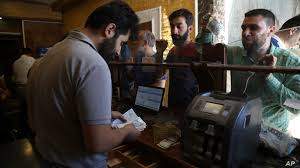US Action Against IS Financier Shows Jihadists’ Cash Flow Continues from Turkey

The U.S. designation last week of a new Turkey-based member of the notorious Rawi Network for allegedly facilitating money transfers to the Islamic State (IS) in Syria has raised fresh concerns among observers that jihadists continue to use Turkey to fund their activities in Syria.
The Rawi Network, founded by an Iraqi family, has been known to the U.S. government for decades. In the 1990s, it was accused of using informal payment systems to help Saddam Hussein’s regime in Iraq evade international sanctions by buying and selling oil without reliance on formal banking systems.
The Rawis returned to the spotlight in November 2019 when the U.S. Department of the Treasury blacklisted six of their members who had operated companies in Iraq, Turkey and Belgium. The companies, registered as everyday money exchange and transfer businesses, were used to provide a mechanism for IS’s global sympathizers to fund the extremist group’s operations in Iraq and Syria.
Last Tuesday, the Treasury sanctioned another man in the family named Adnan Muhammad Amin al-Rawi and described him as an IS facilitator in Turkey.
“Al-Rawi has materially assisted, sponsored or provided financial, material or technological support” for IS, according to the Treasury statement, adding that the radical group’s former finance emir, Fawaz al-Rawi, who was reportedly killed in a 2017 coalition airstrike, belonged to the same family.
While the Rawis have long been a familiar name to governments, analysts say the most recent designation raises questions on why they have continued to be able to operate in Turkey as a member of the U.S.-led Counter ISIS Finance Group (CIFG). The Turkish government did not reply to VOA’s requests for comment on the matter.
“These designations targeting the Rawi Network and others reflect the extent to which various jihadist groups have exploited Turkey’s permissive environment,” said Aykan Erdemir, a former Turkish lawmaker who is currently a Turkey expert with Washington, D.C.-based Foundation for the Defense of Democracies (FDD).
“Turkey is the only NATO member state that has repeatedly become a target of Treasury sanctions, a sign that Ankara is either negligent or lenient in its treatment of jihadist entities and individuals,” Erdemir added.
In April 2019, the Treasury sanctioned four Turkish companies for providing financial support to IS.
Last Tuesday, Treasury Secretary Steven Mnuchin called for vigilance among U.S. allies.
“Together with our CIFG partners, we must remain vigilant to ensure that the global remnants of this terrorist group do not regain a foothold,” Mnuchin said.
Hawala money transfer
The recent U.S. designation also targets 30-year-old Faruq Hamud, who allegedly used a hawala money transfer business in Syria’s al-Hol refugee camp to fund jihadists. Al-Hol is under the control of U.S.-backed Syrian Democratic Forces (SDF) in the country’s northeast.
Similar to the U.S.-based Western Union financial services company, hawala is a popular informal remittance method used within and among cash-based countries throughout the Middle East. It depends on a network of connected agents who can ensure thousands of dollars travel beyond borders in minutes.
SDF did not respond to VOA’s questions on whether it was aware of Hamud’s alleged illicit activities in the camp in Syria’s Hasakah province near the Iraqi border.
An effective U.S. ground partner against IS in Syria, SDF has repeatedly complained that it does not have adequate resources to maintain proper security of the camp, calling on governments to take back their citizens among the camp’s 11,000 family members of foreign jihadist fighters.
Camp smuggling
The al-Hol camp also accommodates nearly 60,000 internally displaced persons (IDPs) from other parts of Syria and some refugees from Iraq. Camp authorities say they have physically separated IS family members from the rest of the camp’s residents.
There are at least two hawala offices that openly conduct business in the non-IS section of the camp, but money often gets smuggled from those offices to IS family members as well, according Thomas McClure, a Syria-based researcher with Rojava Information Center.
“The foreign women aren't allowed to receive money,” McClure said, “but when they want to receive money, the Syrian and Iraqi people get it from the hawala offices in the Souq [a market in the camp] and give it to them for a cut for smuggling them.”
Some of the IS families reportedly receive outside donations that amount to more than $3,000 a month, while an average family in the camp spends one-tenth of that amount, according to a report published by North Press Agency, a local news site.
Hawala also provides a useful means of sending humanitarian support to IDPs and refugees, say some analysts. While banning them outright is not advised, experts say the business can be regulated in a way that prevents IS access to outside donations.
“The hawala money transfer system is crucial to remain open for the women to be able to purchase what they need for their families,” Anne Speckhard, director of the Washington, D.C.-based International Center for the Study of Violent Extremism (ICSVE), who has visited the al-Hol camp for research, told VOA.
“But it should be regulated so large sums are not transferred,” she added. “Likewise, large sums make it very possible to bribe those receiving the money and those who would smuggle the women out.”











